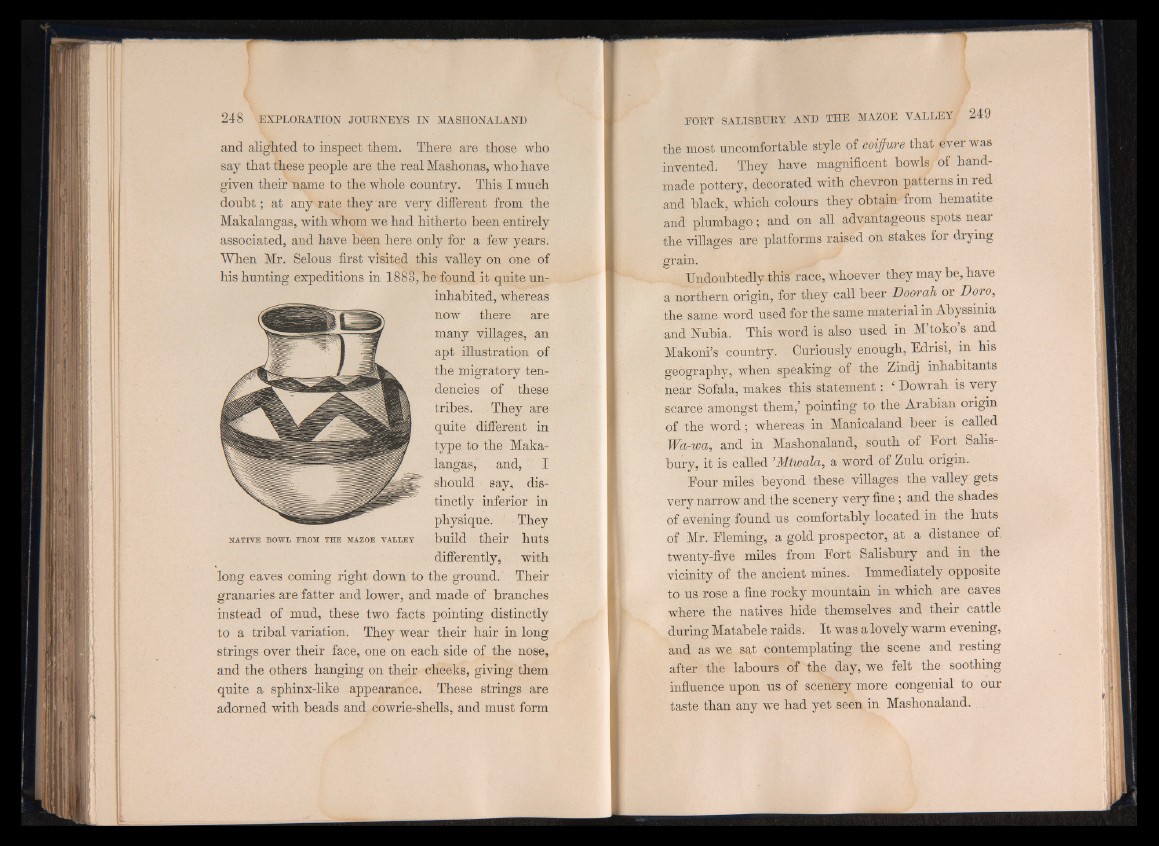
and alighted to inspect them. There are those who
say that these people are the real Mashonas, who have
given their name to the whole country. This I much
doubt; at any rate they'are very different from the
Makalangas, with whom we had hitherto been entirely
associated, and have been here only for a few years.
When Mr. Selous first visited this valley on one of
his hunting expeditions in 1888, he found it quite uninhabited,
whereas
now there are
many villages, an
apt illustration of
the migratory tendencies
of these
tribes. They are
quite different in
type to the Makalangas,
and, I
should say, distinctly
inferior in
physique. They
NATIVE BOWL FROM THE MAZOE VALLEY b u i l d t h e i r h u t S
differently, with
long eaves coming right down to the ground. Their
granaries are fatter and lower, and made of branches
instead of mud, these two facts pointing distinctly
to a tribal variation. They wear their hair in long
strings over their face, one on each side of the nose,
and the others hanging on their cheeks, giving them
quite a sphinx-like appearance. These strings are
adorned with beads and cowrie-shells, and must form
the most uncomfortable style of coiffure that ever was
invented. They have magnificent bowls of handmade
pottery, decorated with chevron patterns in red
and black, which colours they obtain from hematite
and plumbago ; and on all advantageous spots near
the villages are platforms raised on stakes for drying
grain.
Undoubtedly this race, whoever they may be, have
a northern origin, for they call beer Doorah or Doro,
the same word used for the same material in Abyssinia
and Nubia. This word is also used in M’toko’s and
Makoni’s country. Curiously enough, Edrisi, m his
geography, when speaking of the Zindj inhabitants
near Sofala, makes this statement: ‘ Dowrah is very
scarce amongst them,’ pointing to the Arabian origin
of the word; whereas in Manicaland beer is called
Wa-wa, and in Mashonaland, south of Fort Salisbury,
it is called ’Miwcdci, a word of Zulu origin.
Four miles beyond these villages the valley gets
very narrow and the scenery very fine ; and the shades
of evening found us comfortably located in the huts
of Mr. Fleming, a gold prospector, at a distance of
twenty-five miles from Fort Salisbury and in the
vicinity of the ancient mines. Immediately opposite
to us rose a fine rocky mountain in which are caves
where the natives hide themselves and their cattle
during Matabele raids. It was a lovely warm evening,
and as we sat contemplating the scene and resting
after the labours of the day, we felt the soothing
influence upon us of scenery more congenial to our
taste than any we had yet seen in Mashonaland.